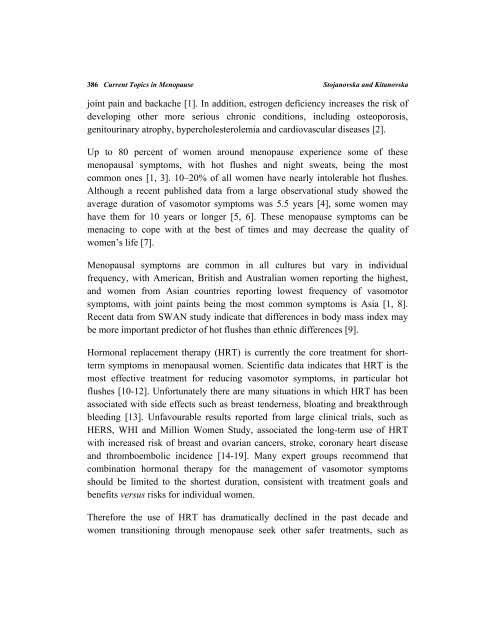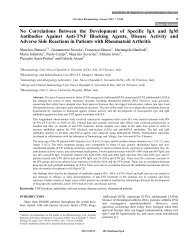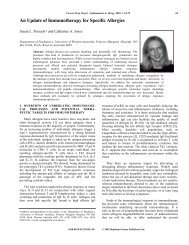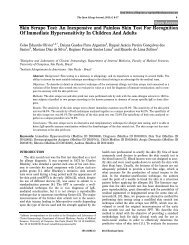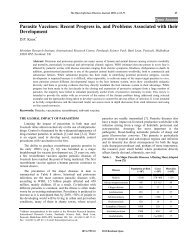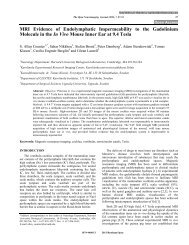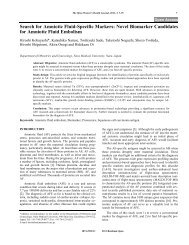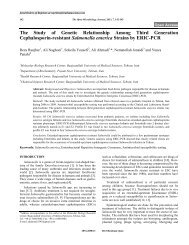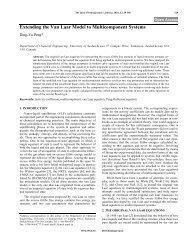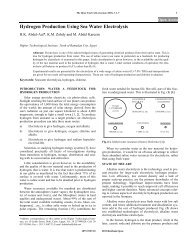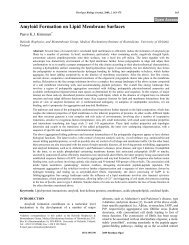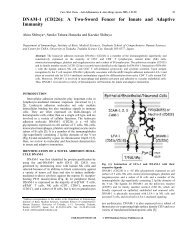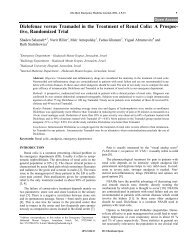Download - Bentham Science
Download - Bentham Science
Download - Bentham Science
You also want an ePaper? Increase the reach of your titles
YUMPU automatically turns print PDFs into web optimized ePapers that Google loves.
386 Current Topics in Menopause Stojanovska and Kitanovska<br />
joint pain and backache [1]. In addition, estrogen deficiency increases the risk of<br />
developing other more serious chronic conditions, including osteoporosis,<br />
genitourinary atrophy, hypercholesterolemia and cardiovascular diseases [2].<br />
Up to 80 percent of women around menopause experience some of these<br />
menopausal symptoms, with hot flushes and night sweats, being the most<br />
common ones [1, 3]. 10–20% of all women have nearly intolerable hot flushes.<br />
Although a recent published data from a large observational study showed the<br />
average duration of vasomotor symptoms was 5.5 years [4], some women may<br />
have them for 10 years or longer [5, 6]. These menopause symptoms can be<br />
menacing to cope with at the best of times and may decrease the quality of<br />
women’s life [7].<br />
Menopausal symptoms are common in all cultures but vary in individual<br />
frequency, with American, British and Australian women reporting the highest,<br />
and women from Asian countries reporting lowest frequency of vasomotor<br />
symptoms, with joint paints being the most common symptoms is Asia [1, 8].<br />
Recent data from SWAN study indicate that differences in body mass index may<br />
be more important predictor of hot flushes than ethnic differences [9].<br />
Hormonal replacement therapy (HRT) is currently the core treatment for shortterm<br />
symptoms in menopausal women. Scientific data indicates that HRT is the<br />
most effective treatment for reducing vasomotor symptoms, in particular hot<br />
flushes [10-12]. Unfortunately there are many situations in which HRT has been<br />
associated with side effects such as breast tenderness, bloating and breakthrough<br />
bleeding [13]. Unfavourable results reported from large clinical trials, such as<br />
HERS, WHI and Million Women Study, associated the long-term use of HRT<br />
with increased risk of breast and ovarian cancers, stroke, coronary heart disease<br />
and thromboembolic incidence [14-19]. Many expert groups recommend that<br />
combination hormonal therapy for the management of vasomotor symptoms<br />
should be limited to the shortest duration, consistent with treatment goals and<br />
benefits versus risks for individual women.<br />
Therefore the use of HRT has dramatically declined in the past decade and<br />
women transitioning through menopause seek other safer treatments, such as


